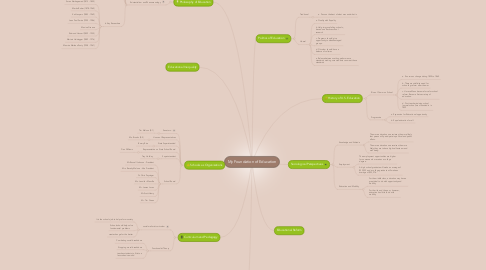
1. Sociological Perspectives
1.1. Knowledge and Attitude
1.1.1. The more education one recieves the more likely that person will participate in political and public affairs.
1.1.2. The more education one receives the more likely they are to have high self-esteem and well being.
1.2. Employment
1.2.1. The employment opportunities are higher for someone who receives a college degree.
1.2.2. A high school graduate will make an average of $32,552 and a college graduate will make an average of $53,976.
1.3. Education and Mobility
1.3.1. For the middle class, education may have a great deal to do with opportunity and mobility
1.3.2. For the rich and the poor, however, education has little to do with mobility.
2. Equality of Opportunity
2.1. Follow our blog to never miss an important update, downtime warning or tutorial!
3. Curriculum and Pedagogy
3.1. social meliorist curriculum
3.1.1. It is the schools job to help reform society
3.1.2. Schools should help solve fundamental problems
3.1.3. create change for the better
3.2. Functionalist Theory
3.2.1. Combating social breakdown
3.2.2. Stopping moral breakdown
3.2.3. teaches students to fit into a less cohesive world
4. Schools as Organizations
4.1. Senators:
4.1.1. Tim Melson (R-1)
4.2. House of Representatives
4.2.1. Mo Brooks (R-5)
4.3. State Superintended
4.3.1. Tommy Bice
4.4. Representative on State School Board
4.4.1. Dan Williams
4.5. Superintendent
4.5.1. Trey Holiday
4.6. School Board
4.6.1. Mr. Russell Johnson - President
4.6.2. Mrs. Beverly Malone - Vice President
4.6.3. Dr. Chris Paysinger
4.6.4. Ms. Jennifer Manville
4.6.5. Mr. James Lucas
4.6.6. Mr.Scott Henry
4.6.7. Mr. Tim Green
5. Philosophy of Education
5.1. Existentialism and Phenomenology
5.1.1. 1. Generic Notations
5.1.1.1. People must create themselves, this happens by the choices people make.
5.1.2. 2. Goal of Education
5.1.2.1. Focus on the Individual
5.1.3. 3. Role of Teacher
5.1.3.1. Focus on individual students, instead of class as a whole.
5.1.4. 4. Methods of Instruction
5.1.4.1. Many different methods of instruction, the teacher should know how each of her students learn and incorporate that learning style into the classroom.
5.1.5. 5. Curriculum
5.1.5.1. Focused on humanities
5.1.6. 6. Key Reseachers
5.1.6.1. Soren Kierkegaared (1813 - 1855)
5.1.6.2. Martin Buber (1878 -1965)
5.1.6.3. Karl Jaspers (1883 - 1969)
5.1.6.4. Jean Paul Sartre (1905 - 1986)
5.1.6.5. Maxine Greene
5.1.6.6. Edmund Husserl (1859 - 1935)
5.1.6.7. Martain Heidegger (1889 - 1976)
5.1.6.8. Maurice Merleau-Ponty (1908 - 1961)
6. History of U.S. Education
6.1. Rise of Common School
6.1.1. a. Enormous change during 1820 to 1860
6.1.2. b. There was definite need for schooling reform after the war.
6.1.3. c. Horace Mann became force for school reform. Became first secretary of education.
6.1.4. d. First teacher training school (normal school) was founded in in 1839
6.2. Progressive
6.2.1. a. Expansion for Educational opportunity
6.2.2. b. Equal education for all.
7. Politics of Education
7.1. Tradtional
7.1.1. a. Pass on the best of what was and what is
7.2. Liberal
7.2.1. a. Quality with Equality
7.2.2. b. Help improve failing schools; based on effective school research
7.2.3. c. Programs should give opportunity to disadvantaged groups.
7.2.4. d. Ciriculum should have a balance of cultures
7.2.5. e. Balance between setting performance standards making sure students can meet these standards
